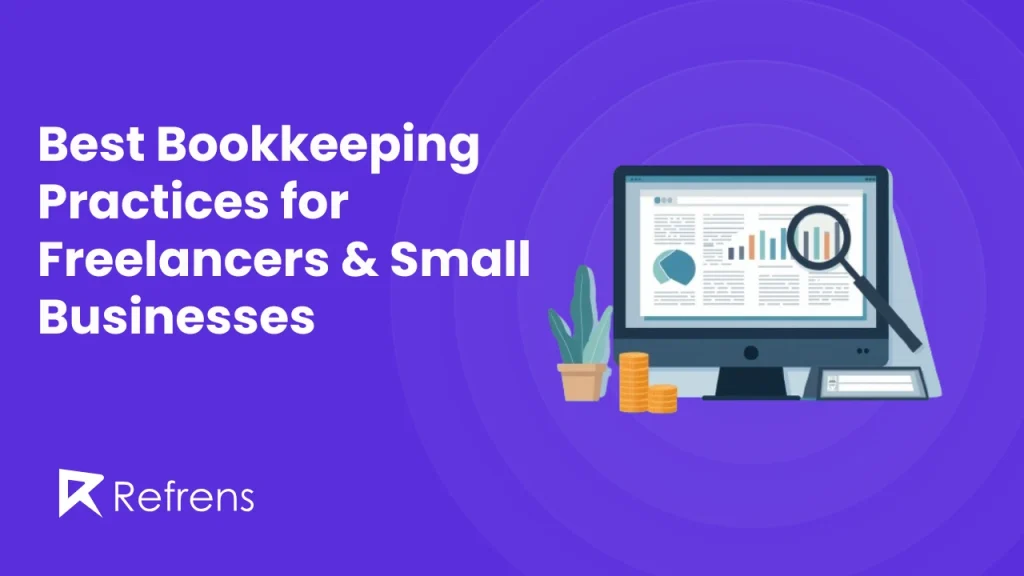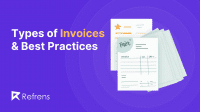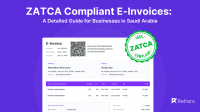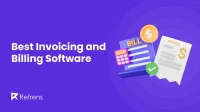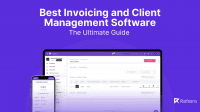Good bookkeeping would ensure that a freelancer or a small business will stay financially organised and tax compliant. This practice includes tracking the income, expense categorisation, and accounting tool utilisation. Proper and timely invoicing and following up on payment also play important roles. If done, these steps ensure improved cash flow, reduced stress, and improved financial decisions in the business.
For any freelance or small business, bookkeeping involves the verification of every penny earned and expended, real-time financial tracking, and thus, helps in compliance with tax obligations and decision-making. Further, it is required to properly manage cash flow, to keep track of income and expenditures, and even for one or two things to consider whenever it comes to preparation for taxes. Unfortunately, when it comes to bookkeeping, obstacles such as making payment arrangements, managing time wisely, and keeping organised records may provide a source of difficulty.
Key accounting bookkeeping service activities include tracking money in and money out, outputting analyses of invoices, and cash management. Bookkeeping can be made simple by using proper accounting software, fixing regular bookkeeping schedules, and careful documentation. Further improvement might include having separate business and personal financial records and getting the advice of a finance professional.
Some bookkeeping issues can be solved simply by running several automated invoices or reminders and outsourcing work if it is too overwhelming. The ability to bookkeep lends financial stability to a business, promoting success in the long term, thus becoming a key consideration in running any freelance job or small business.
Choosing the Right Accounting System
Selecting the appropriate accounting system depends upon the specifications of your business, its size, and its growth propositions. Redundant but simple accounting takes place through manual ledgers and journals. Rather cost-efficient for small companies with regular finances, this, however, becomes tedious and prone to inaccuracies as the company gets bigger and more complicated. There arose some threats of losing or damaging data.
Digital accounting makes use of software for automating such functions as invoicing, payroll, and tax calculations; it is more efficient and reduces errors. It is apt for those businesses with:
- Automation
- Real-time data
- Some initial costs to purchasing the software and training staff.
The separation of personal and business accounting goes a lot further than that, making it accessible from off-site and offering updates in real time. Other advantages include:
- Data security
- Scalability
- Easy integration into other business tools
This makes it best suited for a business with branches or teams at remote locations. All of these come at the price of an ongoing subscription fee and an up-to-date internet connection.
Tracking Income and Expenses
Identifying resources and expenditures is the basis for effective management of finances. It describes where your money is coming from and where it’s going. Budgeting, for example, might be adopted if more revenues than expenses occur. It will determine when tax planning and overall financial health are concerned.
Why Categorise Transactions
Here are the reasons why you have to categorise your transactions:
- Tracking Spending: This will show you where you spend money mainly, thus making it easier to cut out expenses that are not needed.
- Better Budgeting: Tracks and controls all the spending activities against different categories.
- Tax Facilitation: The identification of tax-deductible expenses helps any taxpayer, and may just save them some money.
- Financial Oversight: This enables you to spot any irregularities or unauthorised transactions in the early hours.
Great Tools in Use to Track Finances
- Accounting Software: Getting helped by software like QuickBooks, Zoho Books, or Xero would ensure the categorisation is done automatically and helps to track finances more accurately than manual methods.
- Manual Categorization: If you are a fan of the old manual way of tracking, it is perfectly fine to review and categorise each transaction yourself. It requires a greater time investment.
- Automated Categorization: Many platforms nowadays use some predefined rules or machine learning to do automated transaction categorisation to spare your time and improve accuracy.
Separating Personal and Business Finances
To protect personal assets, ensure easier bookkeeping, and remain tax compliant, an existing business account and separate revenues from the personal side are important. Mixing funds can generate complications, erroneous financial statements, and, further ability for audit scrutiny.
Reason to Have a Dedicated Business Bank Account
- Clean Bookkeeping: Company bank accounts are a bookkeeping hub for no longer having to sort through mixed transactions rendering account reconciliation and financial statement generation easier.
- Accurate Financial Assessment: Keeping separate accounts allows the generation of solid financial statements that will prove the financial position of the business, which is of utmost importance in evaluating performance and deciding considered actions.
- Tax Compliance: Impersonal accounts help distinguish between the personal and business side, thereby helping double-check for tax returns and lessening IRS scrutiny and penalties.
- Personal Assets Protection: When bank accounts are kept separate, it protects the personal property from attacks of liabilities or claims brought by business activity.
- Building Credibility: Separate accounts signal professionalism and financial discipline, instilling confidence in clients, suppliers, and financial institutions.
- Legal Requirement: For corporations regarded as separate legal entities, Such actions as commingling personal and business funds may do grave injury to the corporate veil and expose the owners to personal liability. An online lawyer consultation issue will give adequate guidance on safeguarding companies from financial mixing and corporate structure.
Managing Expenses Efficiently
- Open a Business Bank Account: Personal and business funds are to be kept separate by having different bank accounts.
- Get a Business Credit Card: A business credit card helps keep track of business expenses, builds business credit, and minimises personal-business charge mixing.
- Maintain Records: Clear records of every business expense and source of income must be kept, regardless of whether they are computer programs or spreadsheets4.
- Apply for a DUNS number: This would help you create a distinct business credit identity.
- Create an Online Corporate Presence: A website for the business and business-specific email accounts should be set up.
- Have Utilities Put in the Name of the Company: Utilities must be in the name of the organisation.
- Apply for Credit in the Name of the Company: For credit application purposes, suppliers or vendors should use your company details.
Understanding Tax Obligations
Freelancers and small business entrepreneurs have to file taxes to sidestep penalties and keep their financial lives in balance. At the same time, since freelancers are not salaried employees, they are responsible for collecting their income, saving the amount of tax due, and filing their tax returns whenever they are due.
Tax Responsibilities
- Income Tax: Freelancers will pay income tax on their profits; limited companies will pay corporation tax, and withdrawals made by directors from the company will incur income tax.
- Self-Employment Tax: If their net earnings for the year are greater than $400, then they are required to pay self-employment tax in the U.S., which would include Social Security and Medicare.
- State Taxes: Most states have estimated tax requirements in addition to federal taxes.
- GST/VAT: In various countries, freelancers are necessitated to apply for GST or VAT whenever their earnings surpass a ceiling fixed above a certain level (e.g., £90,000 in the UK).
- Tax Payment Deadlines: Freelancers pay their estimate taxes quarterly; limited companies should file corporate tax returns and issue financial statements
Common Tax Deductions
A freelancer will reduce his taxable base by considering the following types of business operating costs:
- Paper and stationery (Computer devices and other relevant equipment)
- Travel (fuel, tickets, trips)
- Office and premises rents
- Rent office and premises
- Training courses linked to the area of professionalism
- Advertising and other marketing expenses website, advertising etc.
- Expenses incurred towards finances: (insurance, bookkeeping services).
- Register with the tax authorities as self-employed or as a business entity.
Freelancers submitted the requisite documentation to work from home can also claim deductions for household expenses, like utilities and internet. Keeping accurate records is thus vital if these deductions are to be claimed correctly.
Staying Compliant with Tax Deadlines
- Register as self-employed or business with the Tax authorities.
- File tax returns every year or quarterly as per local laws.
- Tax funds should be saved so that no last-moment financial stress is induced.
- Engage only a professional bookkeeping service so you get the right tax advice and comply with the laws of your region.
Invoicing and Payments Management
This implies timely invoicing and payment management for maintaining a smooth cash inflow and experiencing the outlay of payments when due. Applying professional invoicing approaches and consequent follow-up can thus help reduce delays and keep things stable in the financial context.
Best Practices for Creating Professional Invoices
- The invoices are to be dispatched immediately after the completion of the project or service delivery to avoid payments piling up.
- In terms of putting up your name, brand logo, and contact information, with each service provided, get a business-like appearance.
- Put forward the payment terms inclusive of the due dates, taxes (if any) and the ways you accept payment.
- Multiple payment gateways- Credit/Debit card, internet banking or an online payment gateway for users’ convenience.
- Incorporate functional tools, such as Freshbooks or QuickBooks, capable of generating invoices that can be used to track the payment.
Timely Payments, Overdue Reminders, Follow-ups
- Automated reminders can be programmed through the invoicing software to inform the clients about impending or overdue payments.
- If a payment is overdue, it should be followed up professionally by a courteous email or telephone call.
- Reward early payers or consider long-term client discounts to be made on early payments.
- Charging late fees should be part of your overall approach to making late payments rare and to further remind clients to follow your terms on payments.
- Keep proper tracking of your open invoices to discipline your account receivable, to avoid cash flow problems.
Conclusion
The backbone of financial stability for a freelancer and small business is effective bookkeeping. Guidebooks say that recording income and expenses, accounting for transactions, using proven accounting software, sending clientele timely invoices and following up on payments go a long way toward good financial management and compliance with tax laws. Staying organized and prepared will assist cash flow as well as advance the growth of the business and reach its goals demanded for long-term success. Nurturing such habits early on saves hours of work and endless worries, thus presenting a clear view for shipping decisions.
